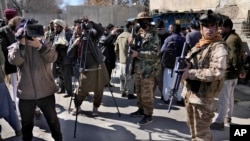Survey: Journalism Is 'Decimated' in Taliban-Ruled Afghanistan
ISLAMABAD - A survey finds that Afghanistan has lost nearly 60 percent of its journalists, especially women reporters, and 40 percent of its national media outlets since the Taliban regained control of the country a year ago.
"All this has happened amid a deep economic crisis and crackdown on press freedom," according to the survey published by Reporters Without Borders, a global media monitor group known by its French acronym RSF.
The findings have been released in connection with the radical Islamic group's first year in power in Kabul.
The impoverished, war-torn South Asian nation has lost 219 of the 547 media outlets it used to have prior to August 15, 2021, when the Taliban seized the Afghan capital and subsequently installed an all-male interim government, RSF said. However, it noted that four new media outlets have since been created.
Of the 11,857 journalists tallied prior to the Taliban takeover, a total of 7,098 of them, 55 percent of whom were males, are no longer working in Afghanistan.
The survey noted that women have suffered most in "the carnage inflicted on Afghan journalism." More than 76 percent of them have lost their jobs and disappeared completely from the media landscape in 11 of the country's 34 provinces.
"Accusations of 'immorality or conduct contrary to society's values' are widely used as pretexts for harassing women journalists and sending them home," the report stated. Women TV presenters have been made to cover their faces while on camera.
"Journalism has been decimated during the past year in Afghanistan," said RSF Secretary-General Christophe Deloire.
"Media and journalists are being subjected to iniquitous regulations that restrict media freedom and open the way to repression and persecution," he lamented.
Deloire urged the Taliban to end the violence and harassment inflicted on media workers, and he said they must allow them to do their job unmolested.
Allegations denied
Abdul Qahar Balkhi, the Taliban foreign ministry spokesman, refuted allegations his government is cracking down on dissent or suppressing media freedom in the country.
"In line with international practices, all reporters and networks operating inside a country have to respect and follow the media laws of that country," Balkhi told VOA.
"The new government of Afghanistan has not requested anything extra nor has it used heavy-handedness in dealing with the media," he argued.
 Afghan cameramen cover a protest against U.S. President Joe Biden in Kabul, Afghanistan, Feb. 15, 2022.
Afghan cameramen cover a protest against U.S. President Joe Biden in Kabul, Afghanistan, Feb. 15, 2022.
Last month, the Taliban supreme leader, Hibatullah Akhundzada, issued a new decree warning that "defaming and criticizing government officials without proof" and "spreading false news and rumors" are forbidden under Islam. It promised unspecified punishment for those who "slander" government employees.
The announcement by the highest Taliban official "is indicative of the determination to suppress press" Afghan media freedom, RSF said.
The survey also cited new economic constraints, such as the termination of international or national funding and the decline in advertising revenue as a result of the economic crisis, for some Afghan media to cease operating.
Of the 2,756 women journalists and media workers employed in Afghanistan prior to August 15, only 656 are still working, with 84.6 percent of them based in the Kabul region.
A large number of Afghan male and female journalists fled the country after the Taliban takeover and as the United States and NATO allies withdrew their troops in mid-August of last year.
Some women journalists, however, decided against leaving the country, RSF said. They include Mean Habib, the director of RouidadNews, a news agency based in the Afghan capital that she created after the August 15 leadership change in Kabul.
"I preferred to stay in my country to report the news and to defend what women had achieved during the past 20 years," Habib told RSF.
She said living and working conditions for women journalists in Afghanistan had always been difficult, but they are experiencing an "unprecedented situation" under Taliban rule. Female media workers who have the opportunity to work are doing so for a "wretched salary," Habib lamented.
"They do their duty to report the news on an empty stomach. They work in conditions that are physically and mentally violent and tiring, without any protection. Today, all the associations defending journalists' rights are made up entirely of men, and work for men!"
Hafizullah Barakzai, who heads the Council of Journalists in Afghanistan, told RSF that the economy was the most important problem facing media outlets and workers. He noted that "the number of cases of violence has decreased compared with recent years, despite the increase in threats during the first months after August 15."
In 2012, Afghanistan was ranked 150th out of 179 countries in RSF's Press Freedom Index.
The global monitor group said that the country had risen to 122nd out of 180 countries by 2021, citing a dynamic media landscape and the adoption of legislation protecting journalists. "And in 2022, after losing nearly 40% of its media and more than half of its journalists, it has fallen to 156th."
